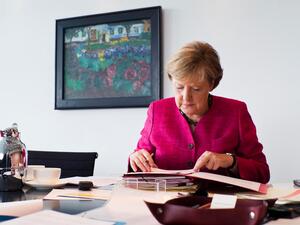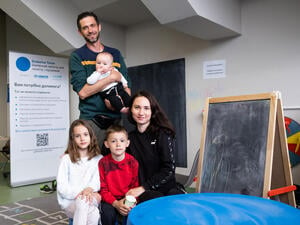UNHCR concerned by build up along borders and additional hardships for refugees and asylum seekers
UNHCR concerned by build up along borders and additional hardships for refugees and asylum seekers
UNHCR is concerned by recent restrictive practices adopted in a number of European countries that are placing additional undue hardships on refugees and asylum-seekers across Europe, creating chaos at several border points, and putting particular pressure on Greece as it struggles to deal with larger numbers of people in need of accommodation and services.
On 17 February, Austria announced it would place a daily limit of 3,200 people to enter its territory and only accept 80 new asylum applications per day. Slovenia followed suit and announced a similar cap to restrict movements across its borders. These newest restrictive measures risk violating EU law and undermine efforts for a comprehensive and coordinated approach to deal with the refugee and migrant crisis in Europe.
In addition, on 18 February, the Heads of Police Services of Austria, Slovenia, Croatia, Serbia and the former Yugoslav Republic of Macedonia issued a statement announcing their agreement to jointly profile and register refugees and asylum-seekers at the border between the former Yugoslav Republic of Macedonia and Greece, as well as take a number of additional actions to manage the situation.
While coordinated action can help the management of the mixed migration movement, the statement has been interpreted differently by countries resulting in increased protection risks for refugees and asylum seekers, particularly those with specific needs, such as unaccompanied and separated children. These include lack of proper registration in line with EU and international standards, the selection of people on the basis of nationality and other criteria rather than protection needs, the heightened likelihood of pushbacks and people being stranded in the open exposed to freezing cold weather and at risk of violence and exploitation at the hands of smugglers and traffickers waiting to prey on their vulnerability.
These practices also undermine the Conclusions reached by the European Council last week recalling that to enter the European Union without adequate travel documentation, people need to apply for asylum when reaching an EU country.
The domino effect of Austria and Slovenia's daily caps and their joint approach with Croatia, Serbia and the former Yugoslav Republic of Macedonia has already resulted in a buildup of refugees and asylum-seekers and migrants in Greece and in the former Yugoslav Republic of Macedonia, where nearly 700 people, mostly Afghan nationals, have been barred from accessing admission into Serbia. In order to support a joint approach and to allay fears and potential chaos, States need to inform refugees and asylum seekers of their procedures, including clear details on the criteria for access to admission, asylum or return, in line with applicable laws.
UNHCR and its partners are supporting persons of concern and States with the emergency response across Europe and have been urging countries to implement contingency planning measures and ensure adequate reception conditions, including accommodation, food, and access to asylum procedures, since the beginning of the crisis last summer. UNHCR is making good progress in providing accommodation for 20,000 asylum-seekers in Greece in order to stabilize the situation, reduce irregular secondary movements, but further support and solidarity with Greece, including support for better functioning relocation programme, is needed.
Some 85% of those arriving to Europe come from the top ten refugee producing countries. Most are fleeing war and persecution and in need of international protection. They risk their lives and the lives of their children fleeing the inhumanity and tragedy of conflicts and persecution in their homelands - places like Aleppo that is once again in the news. And yet, with every passing week, it appears some European countries are focusing on keeping refugees and migrants out more than on responsibly managing the flow and working on common solutions. Some States are shifting problems onward rather than trying to genuinely share responsibility and show solidarity with one another and with those in need of protection.
A comprehensive, coordinated strategy built on shared responsibility, solidarity and trust among all European States working together is the only way to approach the current emergency.
UNHCR will continue to provide support to States to help manage the situation humanely and in line with international standards including support to reception, asylum systems, and identifying and supporting people with specific needs, such as women-headed households, unaccompanied or separated children, elderly or refugees with disabilities. UNHCR also urges the creation and expansion of credible alternative pathways for refugees to reach safety in Europe and elsewhere in order to ensure that movements are manageable and safe, such as enhanced resettlement, humanitarian admission, family reunifications and student/work visas.
Media contacts:
- Karin de Gruijl, +41 79 255 9213, [email protected]
- Joung-ah Ghedini-Williams, +41 79 881 91 89, [email protected]








